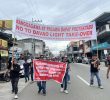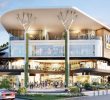
MARKET RESEARCH. PRIME Philippines Founder and Managing Director, Jet Yu, presents the result of the research they conducted to validate the real situation of property business in Davao City amid the implementation of martial law in Mindanao. In a press conference on Monday, July 24, Yu said the city’s hotel sector records a significant drop in terms of bookings and reservations during the 30-day period of Martial law. (Robby Joy D. Salveron/davaotoday.com)
DAVAO CITY, Philippines – The hotel sector here took the brunt of negative impression in the first 30 days of Martial law in Mindanao, a study revealed.
According to Davao’s Real Estate Snapshot under Martial law report conducted by PRIME Philippines, a commercial estate consultancy firm, among the property market –hotel, residential, office and land investment sectors - hotels recorded a huge drop in terms of bookings and reservations.
The study states that “regardless of the hotel ratings, the occupancy rate and gross sales mostly decreased which can be directly associated with a substantial decrease in tourism.”
“In our property market overview, the hotel sector in fact is one of the property business which are hardest hit. Out of the seven hotels surveyed, all seven hotels, four-star, three-star, to two-star hotels all of their sales decreased during the first 30 days of Martial law,” PRIME Philippines Founder and Managing Director, Jet Yu said in a press conference on Monday, July 24 at SM City here.
Based on the Davao City Investment Promotion Center’s (DCIPC) Martial law implications in the city’s tourism sector, 78 functions or events were cancelled while about P20.9 million estimated unrealized revenues were recorded as of June 6, 2017.
The study states that “potential revenue and partnerships generating opportunities were not realized” because of the apprehensions the legal entities had when Martial law was declared in May 23.
The study concludes that based on the research, the main perpetrator of the poor performance was the “fear from tourists outside Mindanao (Luzon, Visayas and foreign countries) that the terrorist attack in Marawi City might happen in Davao City.”
However, out of all the property sectors, only the hotel sector was directly affected by the declaration.
Investors from all over the country with existing investments in the city still indicate a high percentage in terms of their willingness to invest in Mindanao specifically in Davao.
Davao-based investors with existing property investment in Davao records 83.3 percent certainty/willingness to invest more in the city while Luzon and Visayas based investors with existing property investment in Davao has 60 percent certainty.
Based on the research, in a survey with different developers and realty corporations in the city, five commercial development entities have confirmed that the martial law had no effect on their businesses while one even noted an increase in sales.
Hence, according to PRIME Philippines, “large business transactions still occur” during the 30-day period despite the implementation of martial law.
“This suggests that business in Davao City still persists,” the study states.
“Investment and performance persisted as most investors still have a positive outlook on Davao City’s property market. As for the residential and office sectors, businesses were the same as usual. For the land sector, land values remained high with martial law not having a direct effect on land evaluation,” the study concluded.
Yu said after the after the 30-day period, inquiries and sales on the hotel sectors already picked up especially with the Davao Investment Conference (ICON) which was held last week.
“Our outlook remains optimistic for Davao,” Yu stressed.
Meanwhile, the Mindanao Business Council Inc. (MBC) also expressed that “there were no major disruptions of business activities” in Mindanao over the past 60 days of imposition.
In a statement released to the press, MBC Chairman, Vicente T. Lao said “initial concerns on the implementation of martial law in Mindanao prove to be mere perceptions.” Hence, Lao also stressed that the business community in Mindanao supports the extension of martial law.
“The Mindanao Business Council and the rest of the business community in Mindanao strongly support the move of the President Rodrigo Duterte to extend martial law in Mindanao,” Lao said. (davaotoday.com)









